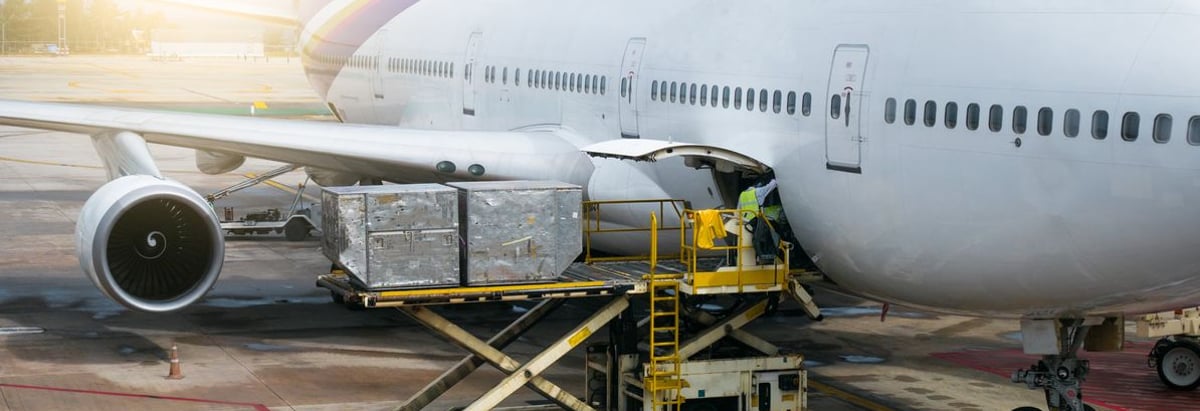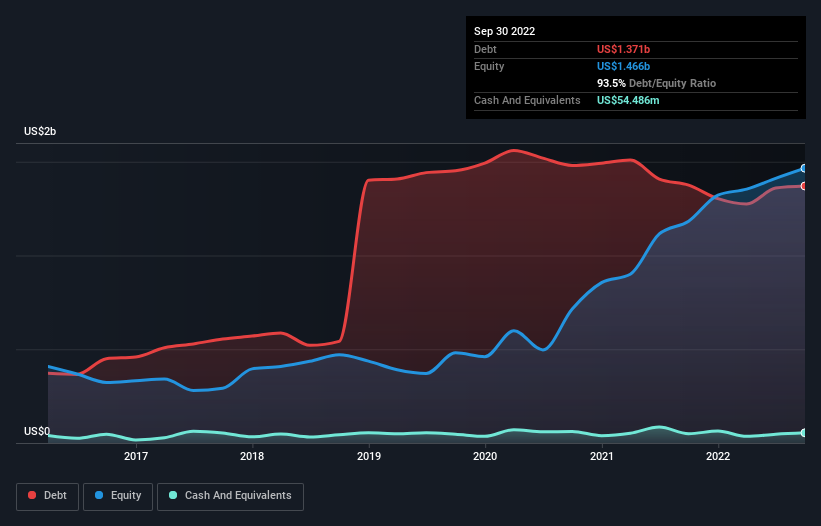- United States
- /
- Logistics
- /
- NasdaqGS:ATSG
Is Air Transport Services Group (NASDAQ:ATSG) A Risky Investment?

The external fund manager backed by Berkshire Hathaway's Charlie Munger, Li Lu, makes no bones about it when he says 'The biggest investment risk is not the volatility of prices, but whether you will suffer a permanent loss of capital.' When we think about how risky a company is, we always like to look at its use of debt, since debt overload can lead to ruin. We note that Air Transport Services Group, Inc. (NASDAQ:ATSG) does have debt on its balance sheet. But is this debt a concern to shareholders?
When Is Debt Dangerous?
Generally speaking, debt only becomes a real problem when a company can't easily pay it off, either by raising capital or with its own cash flow. Ultimately, if the company can't fulfill its legal obligations to repay debt, shareholders could walk away with nothing. While that is not too common, we often do see indebted companies permanently diluting shareholders because lenders force them to raise capital at a distressed price. Of course, debt can be an important tool in businesses, particularly capital heavy businesses. The first thing to do when considering how much debt a business uses is to look at its cash and debt together.
See our latest analysis for Air Transport Services Group
What Is Air Transport Services Group's Net Debt?
The chart below, which you can click on for greater detail, shows that Air Transport Services Group had US$1.37b in debt in September 2022; about the same as the year before. On the flip side, it has US$54.5m in cash leading to net debt of about US$1.32b.

How Healthy Is Air Transport Services Group's Balance Sheet?
The latest balance sheet data shows that Air Transport Services Group had liabilities of US$319.3m due within a year, and liabilities of US$1.74b falling due after that. Offsetting these obligations, it had cash of US$54.5m as well as receivables valued at US$250.5m due within 12 months. So it has liabilities totalling US$1.75b more than its cash and near-term receivables, combined.
This deficit is considerable relative to its market capitalization of US$2.06b, so it does suggest shareholders should keep an eye on Air Transport Services Group's use of debt. This suggests shareholders would be heavily diluted if the company needed to shore up its balance sheet in a hurry.
In order to size up a company's debt relative to its earnings, we calculate its net debt divided by its earnings before interest, tax, depreciation, and amortization (EBITDA) and its earnings before interest and tax (EBIT) divided by its interest expense (its interest cover). The advantage of this approach is that we take into account both the absolute quantum of debt (with net debt to EBITDA) and the actual interest expenses associated with that debt (with its interest cover ratio).
Air Transport Services Group's net debt of 2.1 times EBITDA suggests graceful use of debt. And the alluring interest cover (EBIT of 7.8 times interest expense) certainly does not do anything to dispel this impression. Importantly, Air Transport Services Group grew its EBIT by 45% over the last twelve months, and that growth will make it easier to handle its debt. The balance sheet is clearly the area to focus on when you are analysing debt. But it is future earnings, more than anything, that will determine Air Transport Services Group's ability to maintain a healthy balance sheet going forward. So if you want to see what the professionals think, you might find this free report on analyst profit forecasts to be interesting.
But our final consideration is also important, because a company cannot pay debt with paper profits; it needs cold hard cash. So we always check how much of that EBIT is translated into free cash flow. Over the last three years, Air Transport Services Group barely recorded positive free cash flow, in total. While many companies do operate at break-even, we prefer see substantial free cash flow, especially if a it already has dead.
Our View
Air Transport Services Group's conversion of EBIT to free cash flow and level of total liabilities definitely weigh on it, in our esteem. But its EBIT growth rate tells a very different story, and suggests some resilience. We think that Air Transport Services Group's debt does make it a bit risky, after considering the aforementioned data points together. Not all risk is bad, as it can boost share price returns if it pays off, but this debt risk is worth keeping in mind. The balance sheet is clearly the area to focus on when you are analysing debt. But ultimately, every company can contain risks that exist outside of the balance sheet. For example - Air Transport Services Group has 1 warning sign we think you should be aware of.
At the end of the day, it's often better to focus on companies that are free from net debt. You can access our special list of such companies (all with a track record of profit growth). It's free.
New: Manage All Your Stock Portfolios in One Place
We've created the ultimate portfolio companion for stock investors, and it's free.
• Connect an unlimited number of Portfolios and see your total in one currency
• Be alerted to new Warning Signs or Risks via email or mobile
• Track the Fair Value of your stocks
Have feedback on this article? Concerned about the content? Get in touch with us directly. Alternatively, email editorial-team (at) simplywallst.com.
This article by Simply Wall St is general in nature. We provide commentary based on historical data and analyst forecasts only using an unbiased methodology and our articles are not intended to be financial advice. It does not constitute a recommendation to buy or sell any stock, and does not take account of your objectives, or your financial situation. We aim to bring you long-term focused analysis driven by fundamental data. Note that our analysis may not factor in the latest price-sensitive company announcements or qualitative material. Simply Wall St has no position in any stocks mentioned.
About NasdaqGS:ATSG
Air Transport Services Group
Provides aircraft leasing, and air cargo transportation and related services in the United States and internationally.
Moderate growth potential and slightly overvalued.
Similar Companies
Market Insights
Community Narratives




